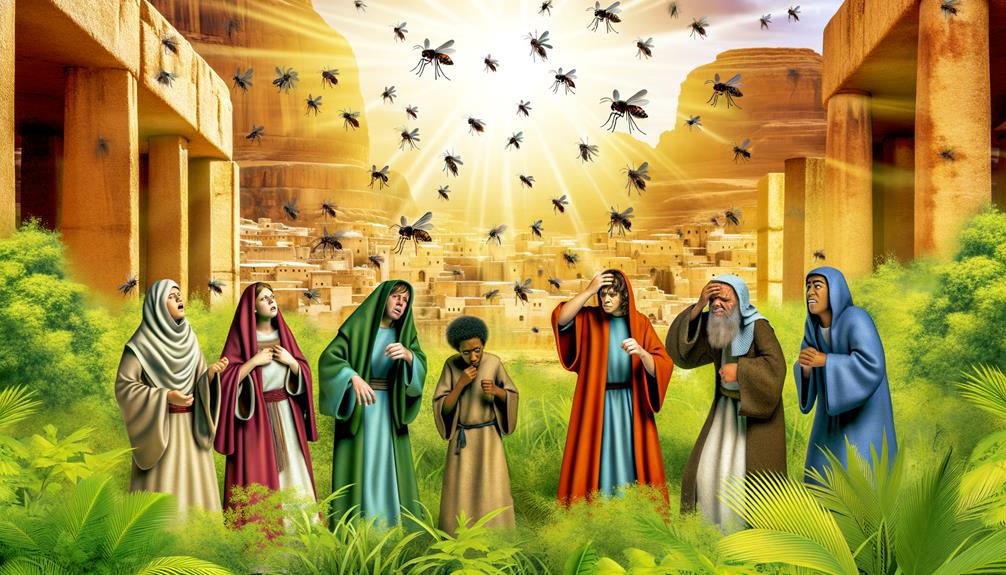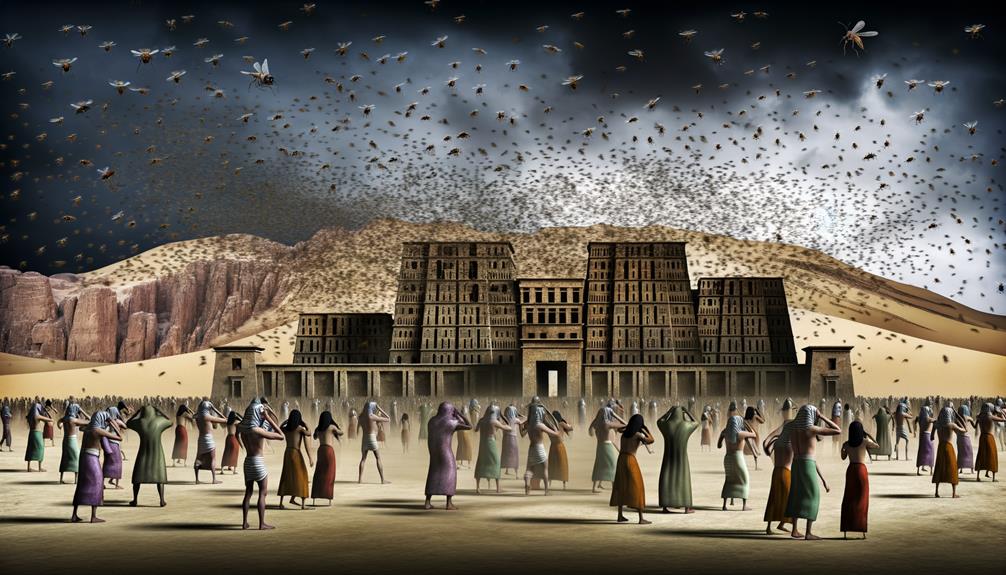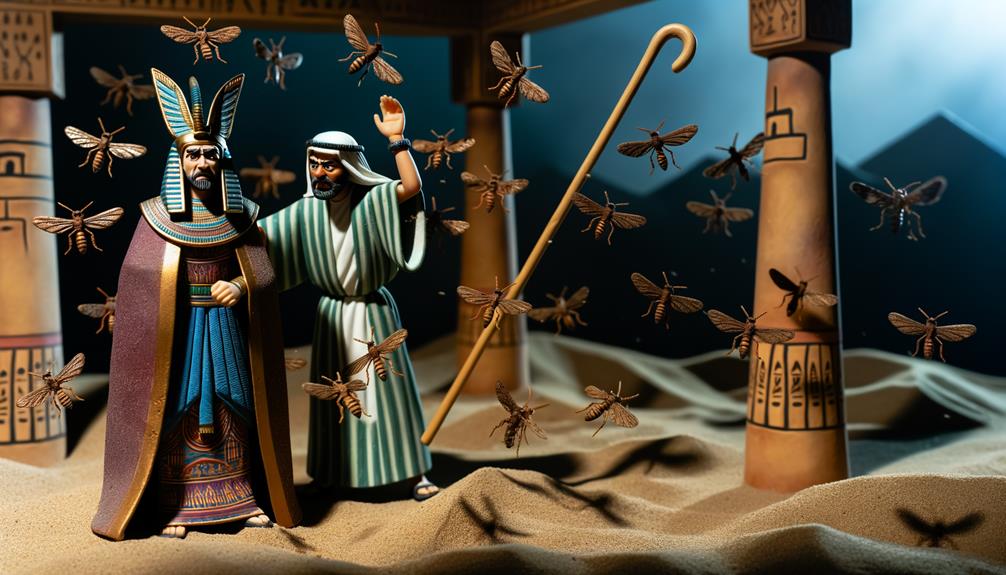Gnats Meaning In The Bible: Judgment and Hypocrisy
In the Bible, gnats appear prominently in the narrative of the ten plagues of Egypt, specifically in Exodus 8:16-19. This third plague, initiated by God’s command through Moses and Aaron, demonstrated God’s supreme power over nature and underscored human vulnerability against divine will.
Pharaoh’s magicians’ failure to replicate it highlighted God’s dominion. Beyond the historical context, gnats symbolized pervasive and inescapable divine judgment, subtly calling for humility and obedience to God’s authority.
This event further illustrated spiritual decay and the need for vigilance against ethical decline, suggesting deeper insights within the broader biblical narrative.

Gnats Meaning in the Bible: Symbolism and Biblical Significance
| Aspect | Biblical Interpretation |
|---|---|
| Literal Meaning | Small, flying insects often considered pests |
| Biblical Reference | One of the ten plagues in Egypt (Exodus 8:16-19) |
| Symbolism | Divine judgment, annoyance, and spiritual impurity |
| Spiritual Lesson | God’s control over creation and warning to the unrepentant |
| Moral Implication | Emphasizes attention to minor sins and spiritual cleanliness |
| Jesus’ Teaching | Criticizing hypocrisy—straining gnats while ignoring bigger faults (Matthew 23:24) |
The Plagues of Egypt

One of the most significant mentions of gnats in the Bible occurs in the context of the Plagues of Egypt, where the third plague, as described in Exodus 8:16-19, saw the land of Egypt being struck by a swarm of gnats produced from the dust.
This event, initiated by the command of God through Moses and Aaron, represented a pivotal moment in the series of divine judgments against Pharaoh and his people.
The gnats, emerging from the dust of the earth, signified the power of God over nature and served as a demonstration of His authority.
The inability of Pharaoh’s magicians to replicate this plague underscored the supremacy of the God of Israel, marking a significant escalation in the narrative of the ten plagues.
Symbolism of Gnats

The gnats in the Bible, particularly within the context of the Plagues of Egypt, serve as a potent symbol of divine intervention and the futility of human resistance against God’s will.
In Exodus 8:16-19, the gnats emerge as the third plague, signifying a direct manifestation of God’s power. This infestation underscores the omnipotence of the divine, as even the smallest creatures can become instruments of God’s judgment.
Historically, these events highlight the limitations of human authority, seen in Pharaoh’s inability to counteract the plague.
Symbolically, gnats represent the pervasive and inescapable nature of divine retribution. Their appearance reminds the faithful of the importance of humility and obedience to God’s sovereign commands, illustrating the broader theological themes of judgment and repentance.
Gnats in Exodus

The Plague of Gnats, as recorded in Exodus 8:16-19, represents the third of ten plagues that God inflicted upon Egypt to compel Pharaoh to release the Israelites from bondage.
This particular plague underscores the power of divine judgment, as Aaron’s act of striking the dust of the ground resulted in the emergence of gnats throughout the land, afflicting both humans and animals.
The inability of Pharaoh’s magicians to replicate this miracle further emphasized the supremacy of the God of Israel over Egyptian deities and sorcery.
Plague of Gnats
In the book of Exodus, the plague of gnats is described as the third of ten divine plagues that God inflicted upon Egypt to compel Pharaoh to release the Israelites from bondage (Exodus 8:16-19). This affliction was marked by Aaron striking the dust of the earth, which then transformed into gnats, infesting humans and animals alike.
Significant aspects include:
- Historical Context: The plague of gnats followed the plagues of blood and frogs, escalating the severity of divine interventions.
- Scriptural Detail: Exodus 8:17 recounts, ‘All the dust throughout the land of Egypt became gnats.’
- Divine Intervention: This plague, unlike the previous two, the Egyptian magicians could not replicate (Exodus 8:18).
Divine Judgment Symbolism
Symbolically, the plague of gnats in Exodus exemplifies divine judgment, serving as a tangible manifestation of God’s supremacy and the futility of resisting His will (Exodus 8:16-19).
Historically, this third plague marked a significant escalation in the series of divine interventions aimed at compelling Pharaoh to release the Israelites. Gnats, minute and pervasive, symbolized the relentless and inescapable nature of God’s judgment.
Scripturally, the inability of Pharaoh’s magicians to replicate this plague underscored the impotence of human and other deities’ powers against Yahweh’s might (Exodus 8:18).
This event illuminates the broader theological theme within Exodus: the affirmation of God’s ultimate authority and the consequential judgment upon those who oppose His divine mandate.
Moral Lessons From Gnats

Gnats, as described in the biblical account of Exodus 8:16-19, serve as a profound symbol of humility and the omnipresence of God’s power.
Their minuscule size underscores the lesson that even the smallest creatures can be instruments of divine will, compelling humanity to recognize and revere the omnipotence of the Creator.
Through this plague, Scripture teaches the importance of humility before God’s majesty, illustrating that no force, however insignificant it may seem, is beyond His command.
Humility and Smallness
The presence of gnats in biblical narratives serves as a poignant reminder of the virtues of humility and the inherent value of smallness, as illustrated in passages such as Exodus 8:16-19.
These minuscule creatures, often overlooked, symbolize how seemingly insignificant entities can carry profound moral lessons:
- Humility: Gnats illustrate the importance of humility in human behavior, as even the smallest beings are part of God’s creation.
- Divine Attention: Their presence emphasizes that nothing is too small to escape divine notice.
- Symbolic Power: The plagues of Egypt, including gnats, demonstrate that small things can have significant impacts.
Thus, gnats encapsulate powerful ethical teachings on humility and smallness.
Recognizing God’s Power
Through their presence in biblical narratives, such as the plague in Exodus 8:16-19, gnats serve as a profound demonstration of the omnipotence of God, illustrating how even the tiniest of creatures can manifest His overwhelming power and authority.
Historically, the plague of gnats represented a pivotal moment where Pharaoh’s magicians failed to replicate the divine act, ultimately acknowledging, ‘This is the finger of God‘ (Exodus 8:19 NIV).
This event underscores a moral lesson: the might of God transcends human capability and comprehension.
Gnats, insignificant in size, were used as divine instruments to convey a message of humility and reverence, reminding believers of the boundless nature of God’s power and the importance of recognizing His supreme authority in all aspects of life.
Spiritual Decay Represented

In biblical exegesis, gnats often symbolize the insidious nature of spiritual decay, subtly infiltrating and corrupting the moral fabric of individuals and communities. This symbolism is evident in passages such as Exodus 8:16-19, where gnats emerge as a divine plague, underscoring the pervasive and often unnoticed onset of moral and spiritual deterioration.
Key aspects include:
- Subtle Infiltration: Gnats, almost imperceptible, represent how minor sins can lead to greater moral decay.
- Divine Judgment: Their appearance as a plague signifies divine disapproval and the consequences of spiritual neglect.
- Moral Corruption: Gnats serve as a metaphor for the spread of corruption within the community.
This representation reinforces the need for continual spiritual vigilance.
Prophetic Visions of Gnats

Prophetic visions in the Bible often employ symbolic imagery to convey deeper spiritual truths, with gnats serving as a potent symbol of minor yet pervasive afflictions.
For instance, the plague of gnats in Exodus 8:16-19 not only demonstrated God’s power to Pharaoh but also illustrated the insidious nature of sin infiltrating the human condition.
Symbolic Biblical Interpretations
Biblical symbolism often employs gnats to represent minute but pervasive nuisances in prophetic visions, as exemplified in the plagues of Egypt described in Exodus 8:16-19. These tiny insects serve as metaphors for seemingly insignificant issues that, when left unchecked, become considerable afflictions.
Scriptural interpretations often highlight the broader implications of gnats, which include:
- Spiritual Disruption: Gnats illustrate the smallest elements capable of disturbing spiritual harmony.
- Divine Judgment: Their presence in prophetic visions can signify divine retribution for disobedience.
- Human Frailty: They underscore human vulnerability to even the most minor irritations.
Such interpretations provide profound insights into the nuanced layers of biblical narratives.
Spiritual Significance Unveiled
The spiritual significance of gnats in prophetic visions is vividly illustrated through their role in the narrative of the Egyptian plagues, where these minuscule creatures serve as harbingers of divine intervention and moral reflection (Exodus 8:16-19).
Here, the gnats emerge as instruments of God’s will, symbolizing both judgment and the omnipotence of the divine.
Historical context suggests that such plagues were perceived not merely as natural disasters, but as profound spiritual lessons aimed at compelling repentance and acknowledgment of God’s supremacy.
Scripturally, the plague of gnats underscores the futility of human resistance against divine mandates, reinforcing themes of humility and submission to God’s authority.
Consequently, gnats encapsulate a pivotal theological message within the biblical canon.
Divine Intervention

Among the numerous instances of divine intervention recorded in the scriptures, the plague of gnats in the book of Exodus vividly exemplifies God’s power and judgment. This event, occurring in Exodus 8:16-19, marks the third plague that God inflicted upon Egypt to compel Pharaoh to release the Israelites from bondage.
The plague of gnats, like others, demonstrated several key aspects of divine intervention:
- Manifestation of Divine Will: The gnats appeared at God’s command through Moses and Aaron.
- Judgment and Punishment: The plague served as a direct response to Pharaoh’s obstinacy.
- Supernatural Authority: Egyptian magicians failed to replicate the miracle, recognizing it as ‘the finger of God’ (Exodus 8:19).
Gnats and Righteous Living

While the plague of gnats in Exodus underscores divine intervention, it also serves as a potent metaphor for the vigilance required in righteous living. Historically, the infestation of gnats (Exodus 8:16-19) symbolizes the minor irritations that can disrupt spiritual cleanliness. In a biblical context, maintaining righteousness requires constant mindfulness and effort to eliminate even the smallest transgressions.
| Scriptural Reference | Interpretation |
|---|---|
| Exodus 8:16-19 | Gnats as divine judgment and need for purity |
| Proverbs 4:23 | Vigilance in guarding one’s heart |
| 1 Peter 5:8 | Be alert and of sober mind |
| Psalm 119:11 | Hiding God’s word in one’s heart to avoid sin |
Thus, the gnats remind believers to remain diligent in their spiritual journey.
Small Sins, Big Impact

Though often dismissed as insignificant, small sins can accumulate and lead to substantial spiritual and moral consequences, as illustrated by the pervasive and disruptive nature of the gnats in Exodus 8:16-19. This biblical plague, one of the ten inflicted upon Egypt, symbolizes how minor transgressions, like gnats, can infiltrate and disturb one’s life and spiritual well-being.
- Cumulative Effect: Small sins, when ignored, can build up, leading to significant moral decay.
- Disruption: Just as gnats disrupted daily life in Egypt, minor sins can disrupt one’s spiritual harmony.
- Visibility: Though tiny, gnats were noticeable and annoying, much like small sins that eventually become apparent.
This parallel highlights the profound impact of seemingly trivial missteps.
Lessons in Obedience

In reflecting upon the narrative of the gnats in Exodus, the imperative for obedience to divine commandments becomes undeniably clear. When Pharaoh hardened his heart and defied God’s directive through Moses (Exodus 8:16-19), the plague of gnats ensued, underscoring the consequences of disobedience.
This episode illustrates that even a seemingly minor defiance against divine authority can invoke significant repercussions. The gnats, a small yet pervasive nuisance, symbolize how persistent disobedience erodes the societal fabric.
Historically, the plagues served as tangible manifestations of divine power, compelling compliance and reverence. Scripturally, this lesson in obedience emphasizes that adherence to God’s will is paramount, reinforcing the broader theological precept that divine sovereignty demands unwavering submission for communal and individual harmony.
Conclusion
The biblical account of gnats, particularly within the context of the Plagues of Egypt found in Exodus, serves as a profound allegory for spiritual decay and divine intervention.
These diminutive creatures symbolize the insidious nature of small sins and their capacity to precipitate significant moral and societal repercussions.
As an anachronistic parallel, just as a computer virus can cripple an entire system, so can minor transgressions erode righteousness.
The narrative ultimately underscores the importance of obedience and vigilance in maintaining spiritual integrity.






